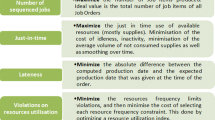Abstract
This paper shows the modeling and solving of a special production fine scheduling problem of the automotive industry. A new scheduling software has been developed to create execution plans to the production activities that satisfy the customers’ demands. The main characteristic of the scheduling problem is that different types of shared resources (e.g. production lines, attachment points, mold carriers, tools) have to be allocated simultaneously, and multi-processing tasks have to be scheduled to meet production orders within strict time limits. To solve the problem we consider not only the primary technological processes but also the tool-preparation processes. This inbuilt sub-problem is converted to a special resource environment by using a problem space transformation procedure. To minimize the tardiness, we schedule the jobs in the given resource environment. We elaborated a new solving algorithm that can create the optimal solution for the sub-problem in polynomial running time. This solution for the sub-problem is applied to meet the tool-preparation constraints of the full production fine scheduling problem. An advanced multi-objective searching algorithm solves the full problem. The paper presents the approach of the developed solving method, the defined objective functions and the applied neighbouring operators. In the solving process, all the decision making sub-tasks (assigning, sequencing and timing) are managed simultaneously. The concrete values of the decision variables are set by a multi-operator and multi-objective local searching algorithm. The fine scheduling software can also support inventory control by using special objective functions that can help to optimize the manufacturing from the point of view of the product type dependent stock levels. The scheduling problem comes from the plant of Fehrer Hungaria Járműipari Kft., specialized in vehicle seat products (Mór, Hungary).
Access this chapter
Tax calculation will be finalised at checkout
Purchases are for personal use only
Similar content being viewed by others
References
Brucker P (2007) Scheduling algorithms, 5th edn. Springer, Berlin
Pinedo ML (2009) Planning and scheduling in manufacturing and service, 2nd edn. Springer, New York
Pinedo ML (2008) Scheduling theory, algorithms, and systems, 3rd edn. Springer, New York
Allahverdi A, Ng CT, Cheng TCE, Kovalyov MY (2008) A survey of scheduling problems with setup times or costs. Eur J Oper Res 187:985–1032
Aytug H, Lawley MA, Mckay K, Mohan S, Uzsoy R (2005) Executing production schedules in the face of uncertainties: a review and some future directions. Eur J Oper Res 161:86–110
Lei D (2009) Multi-objective production scheduling: a survey. Int J Adv Manuf Technol 43(9–10):926–938
Cheng TCE, Sin CCS (1990) A state-of-the-art review of parallel-machine scheduling research. Eur J Oper Res 47:271–292
Koulamas C (1994) The total tardiness problem: review and extensions. Oper Res 42:1025–1041
Mokotoff E (2001) Parallel machine scheduling problems: a survey. Asia-Pac J Oper Res 18:193–242
Baykasoğlu A, Özbakir L, Dereli T (2002) Multiple dispatching rule based heuristic for multi-objective scheduling of job shops using tabu search. In: Proceedings of the 5th international conference on managing innovations in manufacturing, Milwaukee, USA, pp 396–402
Loukil T, Teghem J, Tuyttens D (2005) Solving multi-objective production scheduling problems using metaheuristics. Eur J Oper Res 161:42–61
Sbalzarini LF, Müller S, Koumoutskos P (2000) Multiobjective optimization using evolutionary algorithms. In: Proceedings of the summer program 2000, Center of Turbulence Research, pp 63–74
Kulcsár Gy, Kulcsárné Forrai M (2009) Solving multi-objective production scheduling problems using a new approach. Prod Syst Inf Eng 5:81–94
Kulcsár Gy, Kulcsárné Forrai M (2013) Detailed production scheduling based on multi-objective search and simulation. Prod Syst Inf Eng 6:41–56
Acknowledgements
This research was partially carried out in the framework of the Center of Excellence of Mechatronics and Logistics at the University of Miskolc. The financial background of the software development was provided by the Fehrer Hungaria Járműipari Kft.
Author information
Authors and Affiliations
Corresponding author
Editor information
Editors and Affiliations
Rights and permissions
Copyright information
© 2017 Springer International Publishing AG
About this paper
Cite this paper
Forrai, M.K., Kulcsár, G. (2017). A New Scheduling Software for Supporting Automotive Component Manufacturing. In: Jármai, K., Bolló, B. (eds) Vehicle and Automotive Engineering. Lecture Notes in Mechanical Engineering. Springer, Cham. https://doi.org/10.1007/978-3-319-51189-4_25
Download citation
DOI: https://doi.org/10.1007/978-3-319-51189-4_25
Published:
Publisher Name: Springer, Cham
Print ISBN: 978-3-319-51188-7
Online ISBN: 978-3-319-51189-4
eBook Packages: EngineeringEngineering (R0)




